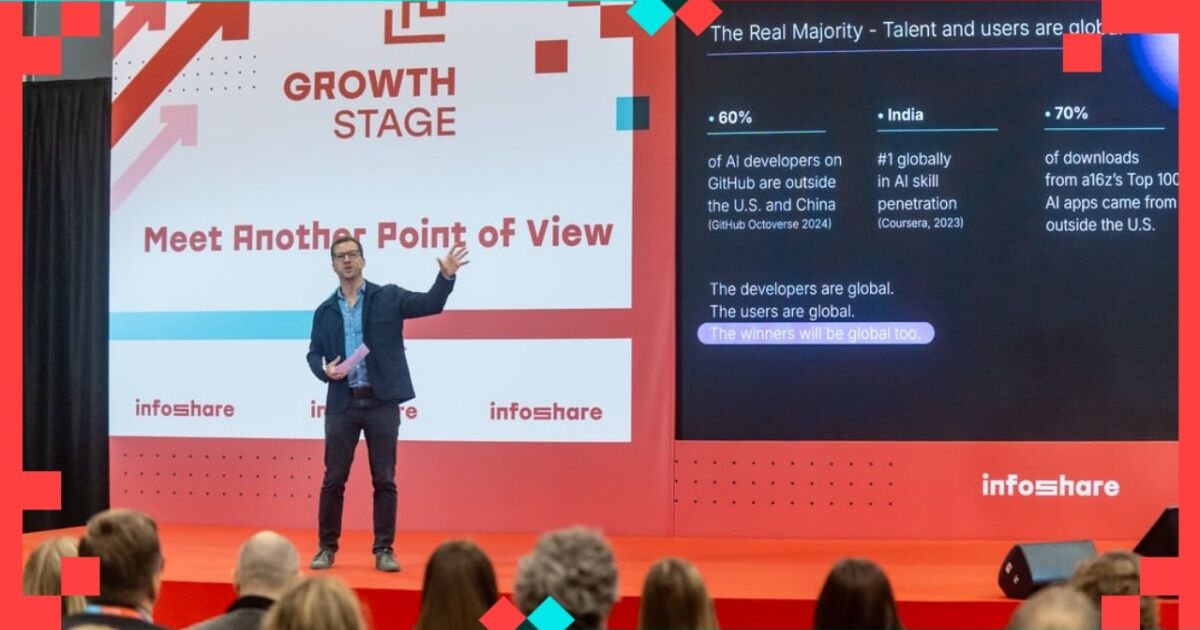VIEW SPEECH SUMMARY
- AI race initiated around the launch of ChatGPT, which reached 100 million users in three months.
- Initial hope was a global opportunity; quickly shifted to focus on Silicon Valley tech giants capturing the most value.
- Despite narratives that AI leadership is limited to U.S. and China, this is challenged based on trends observed over time.
2. Venture Capital and Unicorn Trends
- 20 years ago, 90% of venture capital and unicorns were U.S.-based; now 60% of investment and over 51% of unicorns are outside the U.S.
- Currently, 80% of AI investments go to U.S. and China, but majority of AI developers and users (60%) are outside these markets.
- AI adoption and consumer product downloads are highest in regions like India, LATAM, Southeast Asia, and Eastern Europe.
3. Opportunities in the Application Layer of AI
- AI infrastructure (models, APIs) is becoming commoditized and accessible globally.
- Greatest future value lies in application layers where deep domain expertise, distribution, and user engagement intersect.
- Notable undercapitalization exists in international markets despite recognition of their growth potential by top venture firms.
4. Examples of Successful International AI Startups
- Lucia: Spanish-language AI personal assistant with 65 million users in 18 months.
- Bending Spoons (Italy): Developer of popular apps like Meetup and Remini, valued near $3 billion, builds own AI models for market acquisitions.
- Eleven Labs (Poland): Global leader in voice AI technology, widely recognized internationally.
- Other companies focus on sustainability in data centers (Submar, Spain) and industry-specific AI solutions (Numa, Greece).
5. Endeavor’s Role and Global Impact
- Endeavor Catalyst Fund invests in emerging markets with a mission to support underserved entrepreneurs.
- Over 360 investments in 35+ countries; 1 in 6 investments have become billion-dollar companies.
- Operations span Latin America, Emerging Europe, Southeast Asia, Middle East, and Africa.
- High survival rate of portfolio companies (92% still operating) with several IPOs and exits.
6. Talent and Innovation Outside Traditional Tech Hubs
- Examples of billion-dollar acquisitions with small teams, including those from Ukraine.
- Engineering talent and founder potential exist globally, not limited to Silicon Valley.
- Emerging ecosystems are fertile grounds for future AI unicorns, especially in Eastern Europe and Poland.
Actionable Items / Tasks Discussed:
- Investors should reconsider geographic focus to include international and emerging markets with undercapitalized AI opportunities.
- Entrepreneurs worldwide should leverage AI infrastructure to build valuable applications by combining domain expertise and user engagement.
- Support networks like Endeavor encourage engagement with startups outside traditional tech hubs to foster innovation and scale.
- Emerging markets and regions such as Eastern Europe and India are key areas to watch for AI product adoption and talent development.
- Stakeholders should challenge the notion that AI success is only possible in U.S. or China and recognize the potential for global winners.
Where Will the Next Meta Come From?
10:40 - 11:00, 27th of May (Tuesday) 2025 / GROWTH STAGE
20 years ago, venture capital was essentially a US phenomenon. Since then, it has shifted to a majority of dollars being deployed outside the US. Not only this, but the number of unicorn companies, has also followed this trend. The story seems to be repeating itself in the AI era - OpenAI and Nvidia have become dominant, multibillion/trillion dollar companies and the rest of the world is struggling to keep up. If you believe the media narrative, the AI race has already been won. However, look at who else makes up the Magnificent 7: today we would call Meta an application layer company. It started as a hot-or-not website. Today, they are worth over 1 trillion dollars. Their two biggest acquisitions, Instagram and WhatsApp, had 13 and 55 employees respectively when they bought for billions of dollars. If AI makes it even easier to build a billion dollar company with just a handful of employees, that team can come from anywhere. The next Meta can come from anywhere. My bet is on Eastern Europe.



